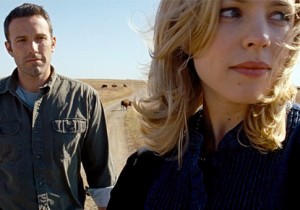TO THE WONDER: 2 STARS
 Terrence Malick took twenty years between making “Days of Heaven” and “The Thin Red Line” and has released just six films in a career that dates back to Badlands in 1973.
Terrence Malick took twenty years between making “Days of Heaven” and “The Thin Red Line” and has released just six films in a career that dates back to Badlands in 1973.
Then in the last two years he’s shot and made five films—three set to come out this year and next—a hectic schedule for anyone but particularly remarkable for one of moviedom’s more notorious procrastinators.
But don’t imagine that he is on autopilot, pumping out movies for the sake of plumping up his resume.
His latest film, “To the Wonder,” starring Ben Affleck, Rachel McAdams, Javier Bardem and Olga Kurylenko, is as daring as anything he’s ever made. In fact his disinterest in traditional narrative has taken him from the oblique to almost experimental.
The “story” begins with Neil (Affleck, as a character so taciturn almost all his dialogue could fit on the back of a matchbook) and Marina (Kurylenko) falling in love in Paris. He’s an American, she’s a Ukrainian divorcée with a small daughter (Tatiana Chiline). Relocating to the states their once torrid relationship becomes lice cold. She goes back to Paris, but soon finds herself missing her old life. Meanwhile Neil begins seeing Jane (Rachel McAdams), a friend from high school as a priest, Father Quintana (Javier Bardem), grapples with his own sense of faith.
Some will describe “To the Wonder” as lyrical and provocative while others will use words like impenetrable and pretentious.
It’s show me don’t tell me cinema—there’s very little actual dialogue, and what there is doesn’t really forward the story—that could easily have been subtitled “Olga Dances and Twirls” given the amount of time we spend watching her in whirling dervish mode.
Her endless dipping and weaving aside, “To the Wonder” has all Malick ‘s trademarks in place—LOADS of narration, the restless camera, even close-ups of grass—but as his films become more like visual poems they also become denser and harder to fathom.
Malik’s films are singular, dreamy experiences that polarize audiences. If you’re like Jane, whose mother said was “chasing moonbeams,” then you’ll find something in the abstract way the story is told.
If not, you may identify with another of her lines. “All we had was… nothing.”
Both views are valid and the deciding factor is you. Adventurous viewers will find something beautiful in the impressionistic storytelling and the subtle way Malik connects Mother Nature with human nature. Others may simply be frustrated by the director’s disregard for customary storytelling.
